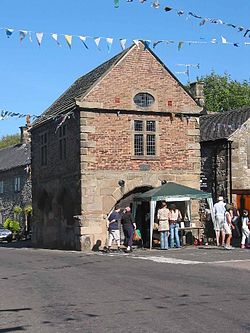Winster
| Winster | |
| Derbyshire | |
|---|---|
 The Market House, Winster | |
| Location | |
| Grid reference: | SK241605 |
| Location: | 53°8’31"N, 1°38’24"W |
| Data | |
| Population: | 633 |
| Post town: | Matlock |
| Postcode: | DE4 |
| Dialling code: | 01629 |
| Local Government | |
| Council: | Derbyshire Dales |
| Parliamentary constituency: |
Derbyshire Dales |
Winster is a village in the Peak District of Derbyshire, about 5 miles from Matlock and 6 miles from Bakewell. It sits at approximately 800 feet above sea level.
A modets place, counted at 630 souls in 2001, the village yet supports a primary school, three churches, two pubs, and a village shop which includes a Post Office.
This was formerly a centre for the lead mining industry. Today it is more used to the day visitor, and is part of the Peak District National Park.
About the village
Winster was mentioned in the Domesday Book of 1086 when it was owned by Henry de Ferrers.[1]
The village has a large number of listed buildings, including the Market House, which belongs to the National Trust and is open daily as an information point. This was the Trust's first property in the Peak District, acquired in 1906.
A workhouse at Bank Top was opened in 1744. It had a rule that forbade any relief outside of the workhouse. By the 1770s it could house 40 inmates.[2]
Winster Wakes

Winster's Parish Church is the Church of St John The Baptist, and a week-long annual carnival called Winster Wakes starts on the first Sunday on or after June 24 (the patronal day of St John The Baptist). The Main Street is closed briefly on the Sunday for the Wakes Parade, and for much of the following Saturday afternoon, when there are stalls and entertainment (including Morris Dancing) in the street.
One of the last duels
In May 1821 a young surgeon, William Cuddie, was killed in one of the last duels to take place in Britain. Cuddie was aged 31 and had fallen in love with Mary, the daughter of the wealthy Brittlebank family of Oddo House. For some reason one of her brothers, William Brittlebank, tried to keep them apart. One evening the two men quarrelled. The doctor later received a note asking:
| “ | Sir, I expect satisfaction for the insult you dared to offer me at a time when you knew that my situation with a helpless Woman prevented my chastising you. Name your time and place, the bearer will wait for an answer. Yours William Brittlebank, Junior. I shall be attended by a friend and prepared with pistols, and if you don't meet I shall post you as a coward. | ” |
Cuddie refused to reply to the letter and the following afternoon the three Brittlebank brothers turned up in his garden with two loaded pistols. Cuddie reluctantly accepted one of the weapons. William Brittlebank walked 15 yard away, turned and fired. Two shots were heard but only Cuddie was hit. He died a few hours later.
Two of the Brittlebanks were tried in Derby to be found not guilty of murder, while their brother William fled to Australia with a £100 reward on his head, never to return to Britain.
Outside links
| ("Wikimedia Commons" has material about Winster) |